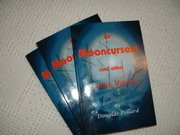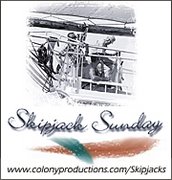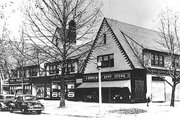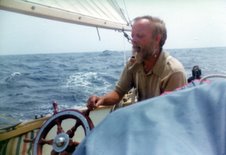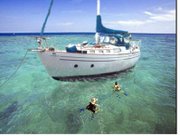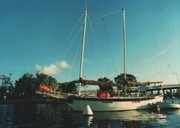Dad parked the old 1929 Ford sedan on Dundalk Ave. All us kids got out carrying towels, picnic basket and bathing suits. We stood at the Dundalk street car stop that was by many still called the train stop. None of us kids ever saw a train on those tracks. But there was a time when trains ran from Baltimore to Sparrows Point.
In a few minutes we could see the Red Rocket swaying it's way toward us. The old car stopped and after a massive merging and separating people some headed off across the tracks to Dundalk as well as the other way to St. Helena. ( pronounced back then as Sanealina). Baltimoreans couldn't or wouldn't say any two words separately. They ran them together or left some of the letters out and maybe both.. As a result most that I know can't spell anything correctly including me. To get aboard the Red Rocket you moved in close to the back door so that nobody could get off. By some mirical of maneuverability The comers and goers kind of merged and at the same time separated as streetcar riders were prone to do. Through some unspoken understanding everybody wound up where they were supposed to be,and good naturally at that.
Riding the number twenty six streetcar was a was a thing that a book could be written about. If You paid a nickel to get on anywhere east of downtown you could go anyplace south, North or West. At the same time If you didn't get a transfer you could get a return ticket free. If you got a transfer you could buy a return ticket for a penny. If you got on anywhere East of down town and headed East you could go to bay Shore Park and use the transfer to go back home.
Well after we got our fairs all settled we made our way forward to find seats. The old wooden cars creaked and groaned as they swayed from side to side. The front was swaying one way and the back the other way. If you were in the middle you hardly rocked at all. There were straps hanging from the overhead for standing passengers to hang onto and they swing so violently the slapped the celling. The car was steady picking up speed and and did not stop often after Dundalk. It rolled along threatening to jump off the track at breakneck speed.
A sudden loud roaring sound passed over as an airplane taking off strained to clear the streetcar lines over head. With windows open you could stick your head out a few inches to the metal grate that was there to keep you from getting your head cut off on the side of a truck or other streetcar. We rumble too a stop in Turners Station a few got on and off and we were rolling again. We came to a stop in what looked to be the middle of nothing and people got off carrying fishing poles and some got on with strings of fish and bushels of crabs.
There to the right was the Sunken Barges. Old sailing ships set rotting on the bottom some with masts but most without. People set all around the edges of the hulls fishing and crabbing. We all craned our necks to see as we rolled on. And then the car slowed for the Bear Creek bridge. The trolley eased out on the rickety wooden structure with its crooked rails. Some hid their faces in their hands and the look of concern was on the face of all but the most practiced riders.
My brother sat unconcerned as he road the streetcar across this bridge everyday on his way to Sparrows Point High School where most Dundalk High School kids attended. My sisters were soon to go there as well.
The car came to a halt at the swing section in the middle and then proceeded at a walking pace until on solid tracks again. It picked up speed and was flying just before leaving the bridge The motorman could be seen standing there looking in the mirror at everyone and smiling at us and plainly enjoying the tense faces behind him.
Heading through Sparrows point was a thing to see, Everywhere steam engines pulled rail cars , some were loaded with molten ore or slag to be dumped along the Chesapeake bays shore line, making land as the went. You could feel the heat on your face and arms as we rolled past those fire y cars. Huge blast furnaces stood in a row billowing smoke. Red fires and smoke showed through a hundred openings. Solid tire chain driven trucks trundled their earth shaking loads along cracked and crumbling roads. Roads that could in no way stand the loads carried on them. We road past wooden and brick houses covered in soot and coal dust, that appeared to rust like ancient metal.
In a short time we broke out into clear air and sunlight. The Bay shimmered in the sunlight Its blue gray and green water rolling in the breeze. We soon crossed a bridge and were now looking at the roller coaster in the not to distant Bay Shore Park. Now in full view were buildings, rides and a parking lot full of cars and a most beautiful beach stretch out in front of us. A full football field length wide and people standing standing in the water better than a hundred yards out. The water was about four feet deep out at that distance.
We all got off the street car while the conductor and motorman traded ends flipping the seats back so that the boarding passengers would be facing forward.
The smell of hot dogs, popcorn, steaming crabs and the salty bay filled the air. A caliapy played John Fillip Susas marches both schrill and loud. Barkers yelled out to the crowds while imploring them to win a doll, see a wild man, or go just one round with the local champion boxer. The roar, clatter and screams of the roller coaster suddenly drowned out all else as we all ran to the bath house to change cloths.
In a few minutes we were all in the water. In only a few more minutes some Dundalk boys came running over to spend the day with my sisters. Those boys the girls and my brother were soon off to dance in the huge dance pavilion to the music of a dance band. There was jitterbug, waltz polka, and tango contests all day long an late into the evening.
Most people there were from Baltimore. There were Germans, Italians, Poles and Jews who had always been a big part pf Baltimore. They all spoke in their native lounges all trying to be heard above the din. The most recent immigrants were the German jews they weren't much liked by most people. Not because they were jews I don't think. More because the were aggressive in doing business. Baltimore was kind of small townish and for someone to come out on street and try to force you in the store was hated by everyone. That was their way. There were more coming all the time and with them they brought a sadness. All the different factions in Baltimore stuck together. Italians did not gather on the beach with Poles. The Jews would spread their towels out in the middle of a bunch of Welshmen and shout back and forth in Yitish. All those immagents were wiser than we were they knew Europe and they knew the horror that was coming. After hundreds of generation with war in Europe they could smell war three thousand miles away and years in advance. They knew.
Thinking back I think the young men and girls were trying to make up for the lost time that was coming. They talked about it at our house, the war in Europe that would come to America and they were frightened. I think people tried to ignore the coming horror and at the same time there was a little bit of sadness in gatherings for conversation.
The grown ups drank huge quantities of beer. They danced, laughed and had one big blowout. But it wasn't just the grown ups the children were a big part of the party. Here is where we had the beginnings of learning to dance. We were welcomed good naturedly on the dance floor with the adults.
The revelry continued until midnight. My brother had caught a ride home and brought our car back. All us kids sleep on the way home.
